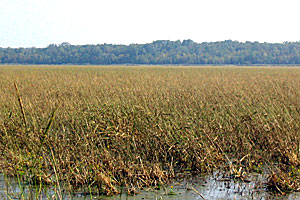
- Details
- By Darren Thompson
MINNEAPOLIS—On July 14, the Fond du Lac and Grand Portage Bands of Lake Superior Chippewa filed a lawsuit in federal court against the Environmental Protection Agency (EPA), citing the Clean Water Act. The lawsuit argues that the EPA approved recommendations by the Minnesota Pollution Control Agency (MPCA) to lower water quality standards, after tribes in Minnesota and the Minnesota Chippewa Tribe voiced against lowering the quality of water.
“It’s really powerful how the Tribes have stood together in this,” Grand Portage Band of Lake Superior Chippewa’s Secretary and Treasure April McCormick told Native News Online. “Even during our consultation with the Minnesota Governor’s Office and Minnesota Pollution Control Agency, we listed fourteen talking points and their response was that the state was moving forward.
In a joint press release by the Fond du Lac and Grand Portage Bands, the lawsuit is considered the first by any tribe, or tribes, filed against the EPA over changes to a state’s water quality standards. “The elimination of numeric water quality standards for industrial and agricultural uses in Minnesota is likely to result in increased pollution in downstream waters that flow around and through the Bands’ reservations, and waters that are important to the Bands’ treaty rights to hunt, fish, and gather throughout ceded territories,” said the Tribes in a press release.
The Tribes contend that the new standards are less protective and pose a threat to Northern Minnesota’s waters, which threatens animal and plant life, including wild rice. The changes eliminate a numeric system for tracking pollutants and relies instead on a “narrative summary.”
“Wild rice is sacred to Anishinabe people,” said Grand Portage Tribal Chairman Robert Deschampe in a statement. “It is unbelievable to us that both the state and federal governments would make these changes without even looking at the potential damage to wild rice waters. We will do all we can to right this wrong.”
McCormick shared that in consultation with the MPCA that wild rice, and protecting it, wasn’t considered, but soybeans, hay, strawberries, and other plants that are considered commercial agricultural commodities were.
“Lower water quality will mean insects that fish live off will be impacted,” she said.
Last fall, Native News Online reported that Minnesota Governor Tim Walz and Lieutenant Governor Peggy Flanagan, an enrolled citizen of the White Earth Band of Ojibwe, hosted a signing ceremony for Executive Order 19-24. The order codifies consultation with Minnesota’s Tribal governments and requires state agencies to develop and maintain ongoing consultation with the tribes on matter that have implications with tribes.
The Minnesota Governor’s Office did not provide a comment as of press time.
More Stories Like This
Feds release draft long-term plans for Colorado River managementApache Leader Walks 60 Miles to Court Hearing That Will Decide Fate of Sacred Oak Flat
Rappahannock Tribe Raises Sovereignty and Environmental Concerns Over Caroline County Water Permit
Klamath Indigenous Land Trust Purchases 10,000 Acres as Salmon Return
Trump signs law that revokes some limits on drilling in Alaska’s National Petroleum Reserve
Help us defend tribal sovereignty.
At Native News Online, our mission is rooted in telling the stories that strengthen sovereignty and uplift Indigenous voices — not just at year’s end, but every single day.
Because of your generosity last year, we were able to keep our reporters on the ground in tribal communities, at national gatherings and in the halls of Congress — covering the issues that matter most to Indian Country: sovereignty, culture, education, health and economic opportunity.
That support sustained us through a tough year in 2025. Now, as we look to the year ahead, we need your help right now to ensure warrior journalism remains strong — reporting that defends tribal sovereignty, amplifies Native truth, and holds power accountable.
 The stakes couldn't be higher. Your support keeps Native voices heard, Native stories told and Native sovereignty defended.
The stakes couldn't be higher. Your support keeps Native voices heard, Native stories told and Native sovereignty defended.
Stand with Warrior Journalism today.
Levi Rickert (Potawatomi), Editor & Publisher

